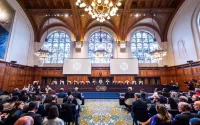31 Janary 2006bernama.com
Global warming could cause ice at both poles of the Earth to start melting this century, driving up sea levels, according to a major study published by the British government.The study, "Avoiding Dangerous Climate Change", collates evidence presented by scientists at a conference staged a year ago ahead of the 2005 Group of Eight (G8) summit, where Britain placed global warming high on the agenda. British Prime Minister Tony Blair added his voice to the warning on Monday."It is clear from the work presented that the risks of climate change may well be greater than we thought," Blair said in the study's foreword. "It is now plain that the emission of greenhouse gases, associated with industrialization and economic growth from a world population that has increased six-fold in 200 years, is causing global warming at a rate that is unsustainable."The consensus view among scientists, the document warned, is of large-scale and irreversible disruption to the planet's climate system if temperatures rise by more than 3 degrees Celsius (5.4 Fahrenheit) above current levels.Such a rise is well within the range of climate change projections for the century, it said, warning: "In many cases the risks are more serious than previously thought."The international conference, which took place in Exeter, southwest England, was the biggest gathering of climate scientists since a landmark report in 2001 published under UN auspices. That report confirmed that temperatures were rising and pinned the blame on carbon emissions disgorged mainly by the burning of oil, gas and coal.It said that future greenhouse gas emissions were likely to raise global temperatures by between 1.4 and 5.8 degrees Celsius (2.5 and 10.4 degrees Fahrenheit) from 1990 to 2100.The temperature has already risen about 0.6 Celsius (1.6 Fahrenheit) since 1900. But the UN report also acknowledged some uncertainties as to when, where and how this pollution would affect the climate.The latest study says that some of the knowledge gap has been filled. Compared with the UN report, it said, there "is greater clarity and reduced uncertainty" about the impacts of climate change across a wide range of systems, sectors and societies.There is a serious risk of large-scale, irreversible system disruption, including the possible destabilisation of the Antarctic ice sheets if the warming goes beyond 3 Celsius (5.4 Fahrenheit) above current levels, the report warned.A regional increase of 2.7 Celsius (4.9 Fahrenheit) above present levels could trigger melting of the Greenland ice cap, it said.It said increasing acidity in the ocean would be likely to reduce the capacity to absorb carbon dioxide from the atmosphere and affect the entire marine food chain.Even a more modest rise in global temperatures of about 1 Celsius (1.8 Fahrenheit) would probably lead to extensive coral bleaching, the report said.






